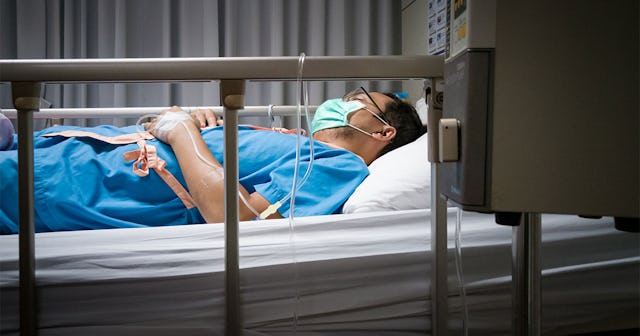My Dad Fought Off One Disease Just In Time For Another One To Kill Him

I’ve always liked the Serenity prayer since I was a little girl, even before I knew which group claimed it as their own. “God grant me the serenity to accept the things I cannot change, courage to change the things I can, and the wisdom to know the difference.” It was written by a theologian and then later adopted by recovery programs the world over. Needless to say, I was going to need this prayer and take it to heart for not only my adolescence but my adulthood too.
My dad was an alcoholic for as long as I remember. Some years were better than others. Those were the years he’d go “on the wagon” and gently ease back off into a glass of wine or a bottle. Those years were less tumultuous, as he’d be a happier person, less like a time bomb ready to go off. When my brother and I were younger, we knew what he was doing was wrong.
We’d often stop in a bar before school (the excuse being that it used to belong to my grandpa — “it was my grandpa’s bar”), and I’m 100% sure there was always something in his coffee. Then my dad’s day would continue, as he’d drink his lunch and then pick us up from whatever sport or after school activity we were doing. There were times when my brother and I knew we should get out and walk, but if we said anything, we’d set off the time bomb. I guess we were lucky. No one got hurt. We made it out alive. And overall, we did have a great childhood, save for these memories that are etched in my mind with a Sharpie.
So, when I was lucky enough to become a parent, because of those indelible memories, I decided to tell my dad he was not allowed to drive around drunk with my son. He could do it with his own kids, but now that his own kid had her own kid, no more. I think this was the day we both hit rock bottom. Imagine telling your dad, in front of your mom, that your childhood days of him being drunk were not going to be repeated on your offspring.
During that talk we probably hit the five stages of grief immediately: denial, anger, bargaining, depression and acceptance. Dad said he was ready to go to AA again (this wasn’t the first time, and I was sad to say, I didn’t think it’d be the last). However, hitting rock bottom that day and fearing the limitation of being around his only grandson at the time, and therefore limiting time with me, my dad managed to battle his demons. The ever-present, elusive monster that had lived inside him his entire life, was finally banished. It was vanquished. And I’d like to say we lived happily ever after but, this is real life.
Not long after his sobriety kicked in, my dad had shown signs of forgetfulness and weird looped conversations. We immediately chalked this up to him having a missing element in his body all the time, and not having it after so many years. But the loops got closer together and the forgetfulness got worse. Just like the alcoholism, our family was no stranger to what we saw before us. Alzheimer’s also ran in the family. Within a few more years, Dad was officially diagnosed with Alzheimer’s disease.
Alzheimer’s is an evil disease, and like alcoholism, takes the person you know from you and replaces them with someone else. As a disease, it usually brings about more sympathy than alcoholism, although one can argue, both are mapped out for you genetically. But little good it does anyone. You might get a good first few years after an Alzheimer’s diagnosis with your person, but this is a slow killer that takes no prisoners.
How did we make it through one disease, only to be living through another? How did my mom deserve this kind of karma in her life — to not only take care of her life partner once, but now twice? What did my dad do to deserve this?
We cannot keep asking the why, or how, as we’re on the tail end of the disease now with my dad. This fall, I had to help my mom check him into a memory care unit near her. He has more bad days than good. He falls all the time; the last one involved a trip to the hospital. He never knows where he is. He calls us over 30 times a day (no exaggeration, and we have the same conversation — only my mom, my brother and I, are programmed into the phone).
We should feel lucky, though, as there won’t be too many more of these repeat, short “how’s the weather” and “I should let you go,” conversations in our future.